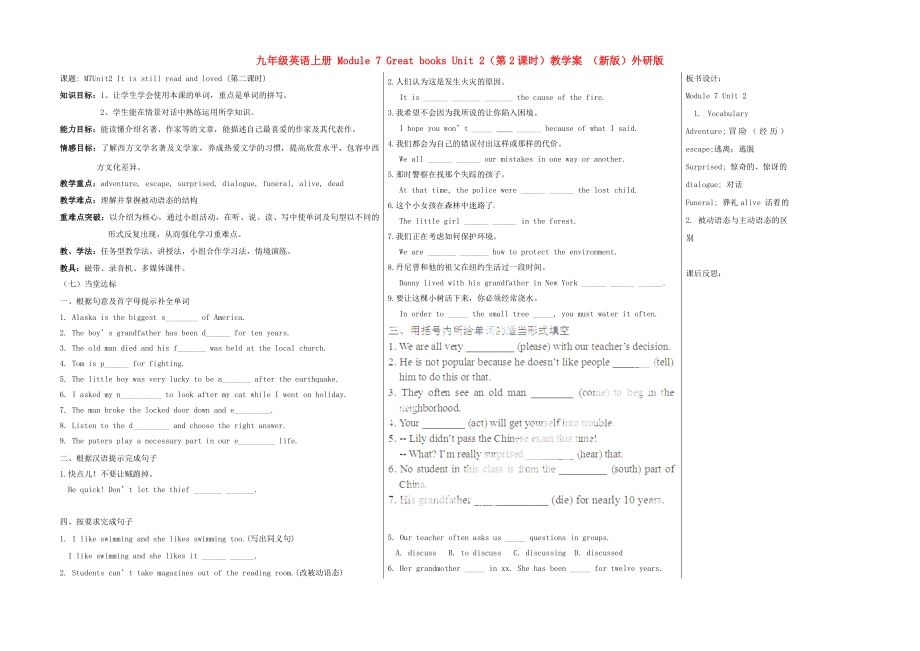《九年級(jí)英語上冊(cè) Module 7 Great books Unit 2(第2課時(shí))教學(xué)案 (新版)外研版》由會(huì)員分享,可在線閱讀���,更多相關(guān)《九年級(jí)英語上冊(cè) Module 7 Great books Unit 2(第2課時(shí))教學(xué)案 (新版)外研版(2頁珍藏版)》請(qǐng)?jiān)谘b配圖網(wǎng)上搜索�����。
1��、九年級(jí)英語上冊(cè) Module 7 Great books Unit 2(第2課時(shí))教學(xué)案 (新版)外研版
課題: M7Unit2 It is still read and loved (第二課時(shí))
知識(shí)目標(biāo):1����、讓學(xué)生學(xué)會(huì)使用本課的單詞,重點(diǎn)是單詞的拼寫��。
2�、學(xué)生能在情景對(duì)話中熟練運(yùn)用所學(xué)知識(shí)。
能力目標(biāo):能讀懂介紹名著���、作家等的文章����,能描述自己最喜愛的作家及其代表作��。
情感目標(biāo):了解西方文學(xué)名著及文學(xué)家��,養(yǎng)成熱愛文學(xué)的習(xí)慣��,提高欣賞水平�,包容中西方文化差異�。
教學(xué)重點(diǎn):adventure, escape, surprised, dialogue, funeral, alive,
2、 dead
教學(xué)難點(diǎn):理解并掌握被動(dòng)語態(tài)的結(jié)構(gòu)
重難點(diǎn)突破:以介紹為核心��,通過小組活動(dòng),在聽�����、說�、讀、寫中使單詞及句型以不同的形式反復(fù)出現(xiàn)��,從而強(qiáng)化學(xué)習(xí)重難點(diǎn)��。
教��、學(xué)法:任務(wù)型教學(xué)法����,講授法,小組合作學(xué)習(xí)法��,情境演練�����。
教具:磁帶����、錄音機(jī)、多媒體課件。
(七)當(dāng)堂達(dá)標(biāo)
一�����、根據(jù)句意及首字母提示補(bǔ)全單詞
1. Alaska is the biggest s________ of America.
2. The boy’s grandfather has been d______ for ten years.
3. The old man died and his f____
3、___ was held at the local church.
4. Tom is p______ for fighting.
5. The little boy was very lucky to be a_______ after the earthquake.
6. I asked my n__________ to look after my cat while I went on holiday.
7. The man broke the locked door down and e_________.
8. Listen to the d_________ and c
4���、hoose the right answer.
9. The puters play a necessary part in our e_________ life.
二��、根據(jù)漢語提示完成句子
1.快點(diǎn)兒�!不要讓賊跑掉����。
Be quick! Don’t let the thief _______ _______.
四��、按要求完成句子
1. I like swimming and she likes swimming too.(寫出同義句)
I like swimming and she likes it _
5�����、_____ ______.
2. Students can’t take magazines out of the reading room.(改被動(dòng)語態(tài))
Magazines can’t _______ _______ out of the reading room.
3. His brother died three years ago.(同義句轉(zhuǎn)換)
His brother has _______ _______ for three years.
4. Does the boy usually sweep the floor in the morning? (改為被動(dòng)語態(tài))
6�、
______ the floor usually ______ ______ the boy in the morning?
5. Mr. Green asks the students to speak English in class. (改為被動(dòng)語態(tài))
The students ______ ______ _______ speak English in class.
6. He is a clever and lively boy. (就畫線部分提問)
What _______ the boy ______?
7. They use the machine f
7�、or washing clothes. (改為被動(dòng)語態(tài))
The machine _______ _______ for washing clothes.
8. Students are allowed to ride in the school. (改為否定句)
Students _______ _______ to ride in the school.
五、單項(xiàng)選擇
1. Jin Yong is one of the greatest and oldest ______writers, He is still ______.
A. living ; alive
8、 B. living��;living
C. alive����;living D. alive; alive
2. I can’t believe these photos _____ by a boy of five years old.
A. is taken B. were taken C. took D. taken
3. --I gained a mark of 59 in the English test.
-- ______.
A. It’s a pity B. Goo
9、d luck
C. Good idea D. Thank you
4. Flowers ____ along the road last year.
A. plant B. planted C. are planted D. were planted
2.人們認(rèn)為這是發(fā)生火災(zāi)的原因��。
It is ______ _______ _______ the cause of the fire.
3.我希望不會(huì)因?yàn)槲宜f的讓你陷入困境��。
I hope you won’t _____ __ ______ because of wh
10���、at I said.
4.我們都會(huì)為自己的錯(cuò)誤付出這樣或那樣的代價(jià)�����。
We all ______ ______ our mistakes in one way or another.
5.那時(shí)警察在找那個(gè)失蹤的孩子�。
At that time, the police were ______ ______ the lost child.
6.這個(gè)小女孩在森林中迷路了.
The little girl ______ ______ in the forest.
7.我們正在考慮如何保護(hù)環(huán)境��。
We are _______ _______ how to protect the envi
11��、ronment.
8.丹尼曾和他的祖父在紐約生活過一段時(shí)間��。
Danny lived with his grandfather in New York ______ ______ ______.
9.要讓這棵小樹活下來�,你必須經(jīng)常澆水���。
In order to _____ the small tree _____, you must water it often.
5. Our teacher often asks us _____ questions in groups.
A. discuss B. to discuss C. discussing D. dis
12、cussed
6. Her grandmother _____ in xx. She has been _____ for twelve years.
A. died; died B. dying; dead
C. died; dead D. dead; died
7. -- How much money did you _____ for the drink?
-- None. It was free.
A. pay B. cost C. take D. spend
(八)錯(cuò)題整理(學(xué)生填寫)
板書設(shè)計(jì):
Module 7 Unit 2
1. Vocabulary
Adventure;冒險(xiǎn)(經(jīng)歷)escape;逃離����;逃脫
Surprised; 驚奇的、驚訝的dialogue; 對(duì)話
Funeral; 葬禮alive 活著的
2. 被動(dòng)語態(tài)與主動(dòng)語態(tài)的區(qū)別
課后反思:
 九年級(jí)英語上冊(cè) Module 7 Great books Unit 2(第2課時(shí))教學(xué)案 (新版)外研版
九年級(jí)英語上冊(cè) Module 7 Great books Unit 2(第2課時(shí))教學(xué)案 (新版)外研版

